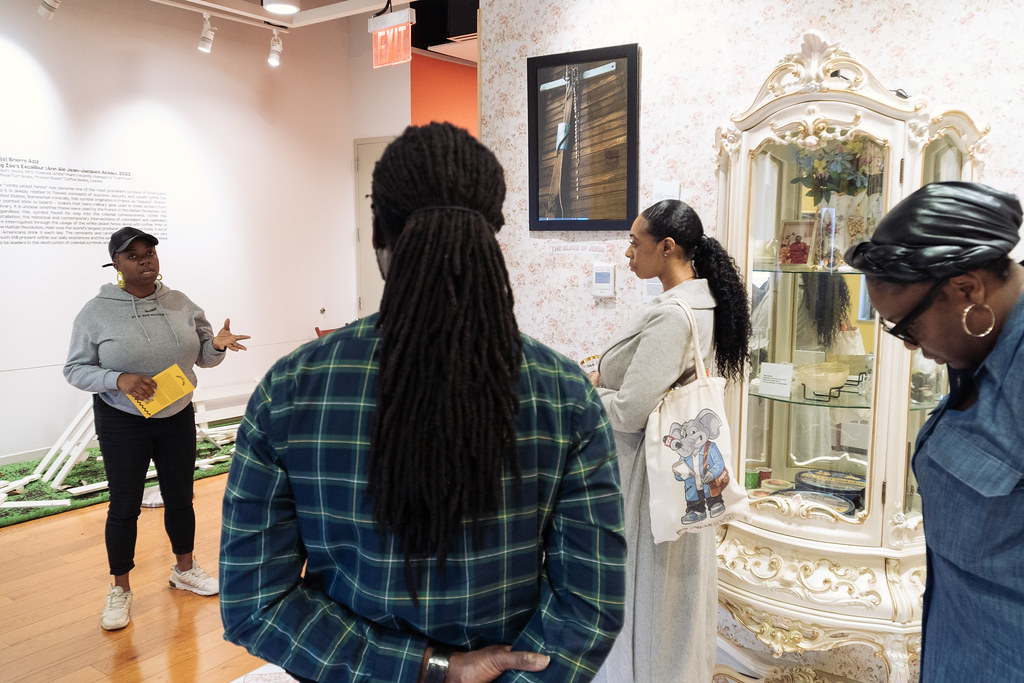CCCADI HOSTS HAITIAN COUNCIL MEMBERS TO DISCUSS RESPONSE PLAN FOR CURRENT EVENTS IN HAITI
The Caribbean Cultural Center African Diaspora Institute leverages its yearlong dedication to Haiti, Lakay se Lakay, to offer a platform for coalition building.
On April 12, 2024, city council members of Haitian descent including Chi Ossé, Council Member for New York City's 36th District, and Mercedes Narcisse, Council Member for the 46th District gathered alongside local Haitian artists, community members and fellow city officials Laurie Cumbo, Department of Cultural Affairs Commissioner, and Majority Whip, Council Member Selvena Brooks Powers, among others at the Caribbean Cultural Center African Diaspora Institute (120 E 125th Street, NY, NY 10035). A focal point of the convening was to discuss the responsibility of both the local and national U.S. government and humanitarian aid to provide the people of Haiti with multilayered support in response to the current civil unrest and violence on the island.
“There are several key points that need to be addressed today. One important message for people to know is that in addressing the current violence in Haiti, we must address the ongoing systemic destabilization of Haiti by outside forces committed to Black oppression. The same systemic oppression my constituents of the Haitian community experience right here in New York City. We also need to take this opportunity to crystallize the issues for the public and to develop an action plan starting in the Haitian community and moving to include everyone who cares for human life,” said Council Member Mercedes Narcisse.
While this April’s meeting prioritized action planning to rally solidarity and support for the restoration of a democratically elected government not influenced by neocolonial paternalism, the convening was also a continuation of CCCADI’s effort to collaborate and involve city council members in its planning and execution of its yearlong 2024 programming theme, Lakay se Lakay, dedicated to uplifting Haitian art and culture. The organization’s first convening with Haitian council members was in May 2023 during the planning stages of Lakay se Lakay to create thought and idea partnership around using arts and culture as a tool to raise awareness of Haiti’s vital and historical role in the liberation and legacy of the African Diaspora.
“CCCADI has a trajectory of leveraging the power of cultural programming to respond to the needs of African Diasporic communities, urgent and ongoing. That’s why we launched a yearlong dedication to Haiti in January and now with the current situation on the island this programming is even more important. History shows us that across the globe Black communities have resisted destructive forces and have risen up against all odds by tapping into our source of power, all of the elements that make up our culture: our art, music, community, system of beliefs; now is no different and that is why I believe the work of CCCADI is essential as a first response,” said Melody Capote, Executive Director of the Caribbean Cultural Center African Diaspora Institute.
Before hearing directly from Narcisse and Ossé, attendees of the convening were given a sense of the reality on the ground in Haiti via a recorded video sent in by Micherline Islanda Aduel, member of the Campesina Tèt Kole Ti Peyizan Ayisyen movement and CLOC-La Via Campesina. Micherline has a relationship with CCCADI as an advisory board member for the organization’s division of work in the Caribbean. In her video statement, shown in Creole and paraphrased in English, Micherline laid out several action items in support of a progressive Haiti:
The creation of a national conference to redefine and define the national project of the sovereignty of the Haitian people, and to develop a 25-year plan.
The creation of a process to deal with the state-sanctioned crimes and massacres in impoverished neighborhoods.
End the circuit of information spreading misinformation and negative perceptions about what’s going on in Haiti.
The creation of a community-led tribunal to bring justice to the massacre and women and child rape victims of terrorist gangs.
The creation of a transitional government by the Haiti presidential council with no imperialist involvement in this process.
Additionally, convening attendees reviewed CCCADI’s Statement on Recent Events in Haiti which laid out eight steps to address the oppression faced by Haitians in Haiti and in the U.S. Among the various points was a call to City Council of New York City, on behalf of the over 700,000 Haitian-born people living in the United States, to adopt a resolution urging an end to the violence, urging non-colonial and humanitarian intervention and pledging the support of the United States for the rebuilding of the infrastructure of the country. The full statement is available here.
Because the legacy of Haiti is broader than its socio-political instability, the convening concluded with the viewing of CCCADI’s current exhibition featuring 11 Haitian Diasporic artists who through their multimedia works explore the concept of home, lakay. The exhibition entitled BYENVENI, which is Kreyòl for “Welcome,” invites viewers to explore Haiti as both a cherished internal sanctuary, preserving cultural traditions and religious practices, as well as an external haven, a space of refuge, familial and communal development, a source of boundless joy, and the cornerstone of sovereignty. The exhibition is available for public viewing through November 14, 2024. Click below to learn more.




